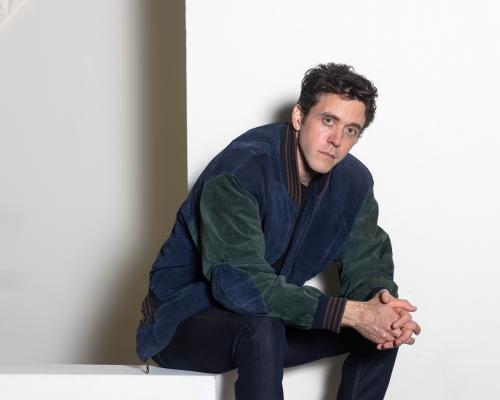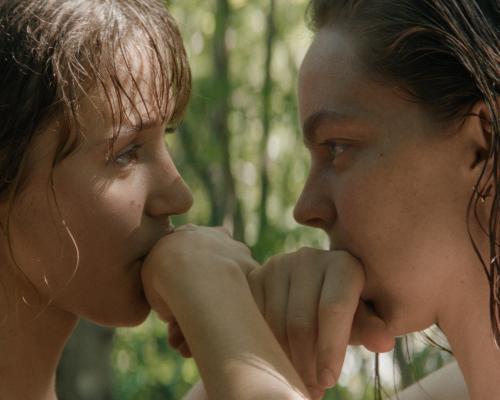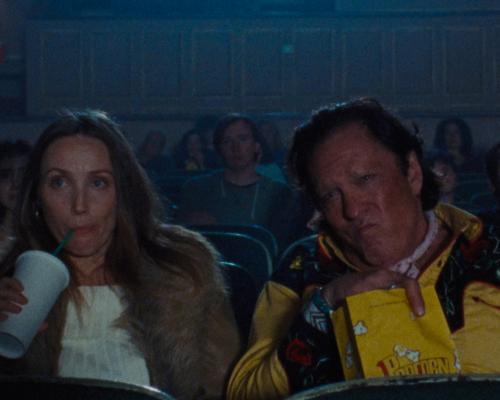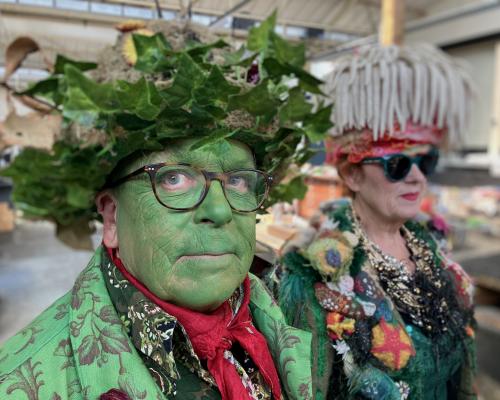
Ashley Zukerman is that guy: you’ll know him from something and you’ll have enjoyed him in it. It might be Nate Sofrelli from Succession, the political strategist who begs for an affair with Sarah Snook’s Shiv Roy – a stalemate that ends in a parked car when Shiv grabs Nate’s hand and shoves it down the front of her jeans. (“A memorable day at work,” says Zukerman.) Or maybe you saw Apple Cider Vinegar, where he played Belle Gibson’s deeply awful and codependent partner. Or in the delightfully daft Dan Brown show The Lost Symbol as the dashing know-it-all symbology expert Robert Langdon. He was also a sinister US politician in Netflix’s Designated Survivor, and is now playing a promising US politician in Apple’s dystopian drama Silo.
Zukerman has noticed the pattern too. “I seem to get cast as American politicians or what I am going to call … morally marginalised nice guys,” he says.
I thought something much meaner, I admit. “Please be meaner,” he says, smiling.
“Slightly wet men,” I say and he bursts out laughing. I’m sure it has nothing to do with what you are like as a person, I hastily add. “Well, I do have access to it,” he says, still laughing.
I leave it an hour before telling him Vulture once called him “a bit of an expert in punchable men”. “I’m honoured,” he replies.
With his angular face and big eyes, the 41-year-old Australian looks not unlike a young Hugh Laurie. He is one of our many secret Australians, armed with such a good American accent it must either be effortless or incredibly hard work. It is the latter, he confirms. “When I’m in America, or even London, I’m in accent all the time, to try to keep that muscle going.” It’s got to the point now that, after a long stint in the US, he sometimes can’t remember what his natural voice sounds like any more.
“Which is so embarrassing,” he says, “because as Australians, I know we hate it when people go overseas and develop a strange transpacific accent. I try to be compassionate to myself when it happens.”
Zukerman doesn’t often do interviews. “Perhaps there’s been some reticence in the past to talk about myself. Maybe I’m different now. We’ll see.” This seems down to a deep anxiety that he’s not expressing himself clearly, though he speaks with great thoughtfulness: “There’s a clarity I have when I disappear – when I work – that sometimes leaves me after the fact.”
We meet in Melbourne while he’s briefly back in his home city to visit family, before returning to London to film the fourth season of Silo. This month, Melbourne International Film festival goers will be able to see him in One More Shot, a time-loop comedy which sees actor Emily Browning rewind time using a magical bottle of tequila at a New Year’s Eve party in 1999; Zukerman plays her seemingly benign friend Rodney. “A super creep,” he says.
Every role Zukerman chooses has a reason “that gets me up in the morning”. On One More Shot, it was his love for “domestic fantasy” flicks, like his childhood favourites Back to the Future and Big: “We rarely make them in Australia – we tend to do horror instead.” As for Silo, he signed on because it was “about living in a dark time and how we keep the light on”.
“I don’t know how to live in this world right now,” he says. “I find it very difficult to comprehend what’s happening around the world and how to handle it and my role to play in it. I don’t think any of us do. But Silo presents a really gentle argument for trying to keep whatever light is inside us alive. Keeping even a small sense of hope or rebellion alive is a lot of work. Look after that, and that might be enough.”
Zukerman was born in America but came to Australia when he was two; his Israeli father and Peruvian mother were academics who moved their young family from Santa Monica to Melbourne for a better life. It was at high school that Zukerman discovered acting gave him an inner clarity he had never known before. “As a kid, at home, I had a hard time knowing what to feel,” he says. “On stage, as a character, I knew how they felt. It was an opportunity to experience something clear.”
Right out of drama school, Zukerman was cast in HBO’s war epic The Pacific, “along with 100 other young white Australian graduates”. It was an “incredibly strange experience”, as a green actor on a huge show produced by Steven Spielberg, but it gave him a new confidence. Afterwards Zukerman flew to Los Angeles to audition for a pilot season – for two months a year, for five years in a row. He had little luck, “but I really loved it. I would do 10 auditions a week and that built a muscle. It was a real high. You’d land and just try to keep your head on straight.”
Like most of the cast of Succession, the show changed his career for ever. Even though Nate was a small role, he was compelling; how he both loved and hated being in Shiv’s orbit, how he bristled at any mention of her husband, Tom, “a corn-fed basic from Hockey Town”. By the end of the show, Nate lost Shiv, a US presidential campaign and perhaps democracy itself to that corn-fed basic.
“I loved how Nate presented as optimistic and egalitarian, but there was something about that family he was so drawn to,” Zukerman says. “He hated them, but he wanted to be a part of it.”
From the first script, he knew Succession was special, an experience he’d only had once before: on Manhattan, the excellent and under-appreciated drama in which he played a physicist working on the atomic bomb in Los Alamos. “The Succession scripts were like reading poetry,” he recalls. “It was a wonderful time, but I also had a hard time on it. The work was so pure and perfect as it was that I learned very quickly that I actually shouldn’t bring anything to it, which is harder.”
For years Zukerman would immerse himself in homework for each role – sometimes too much. During Manhattan, he enrolled in a physics course: “It was insane – I realised very quickly I wasn’t gonna be able to finish so I went back to high school maths.” For The Lost Symbol, he studied the Freemasons and learned Hebrew. But he’s since learned that “just because something looks like work doesn’t mean it helps.”
“Like on Silo, my character is an engineer who becomes a congressperson – how much do I need to know about tunnels?” he says. “I come at things intellectually first, and I find great freedom once I’ve understood it. But I’m drawn to actors who seem to have an extraordinary ability to throw themselves in with very little preparation. I’m fascinated by that.”
Zukerman stepped into Tom Hanks’ shoes to play the young Robert Langdon in The Lost Symbol, which was incredibly fun nonsense. Did he enjoy being the leading man? “I did – but I didn’t like being an archetypal hero. That’s such a strange definition of a human being. We’re drawn to complicated people, not heroes. So I found that difficult. I actually thought he was an odder character than it ended up being, but there was not much room for anything more in a show like that – you’ve got to just solve puzzles.”
It was only a decade ago that Zukerman realised he could probably make a living from acting: “I knew that I wouldn’t have to pivot, and that was an incredible luxury.” He cringes when talking about success, but does admit: “I am proud of my work in the last few years, in a way that I wasn’t before.”
What changed? “There were periods on some of the shows we’ve talked about where I hated the experience of doing it,” he says, carefully. “Or I hated the experience of watching it later. There wasn’t much joy around it. But in the last few years, I’d say that there’s some pride.”
While he is technically American and he loves New York, “when I get to Australia, my shoulders just drop. I understand the people. I have memories of every corner in Melbourne. It is home.”
We farewell on one of Melbourne’s many corners. “I am now remembering why I don’t do interviews very often,” he says. “I feel like I’ve just talked about myself.”
That was kind of the point, I say, and he just laughs.
-
One More Shot is screening around Victoria as part of Melbourne international film festival from 9 August – see here for dates. The film will later be available to stream on Stan.







